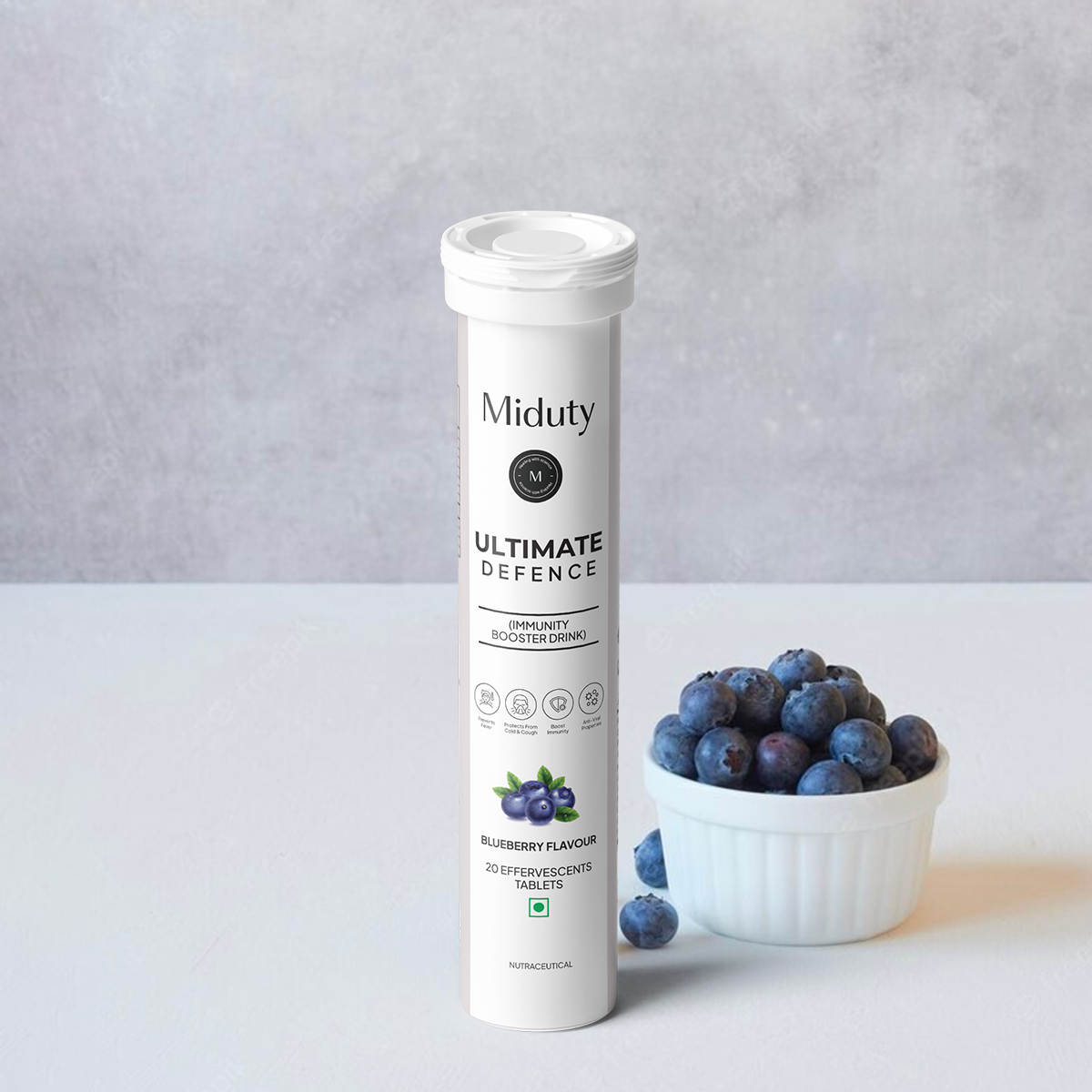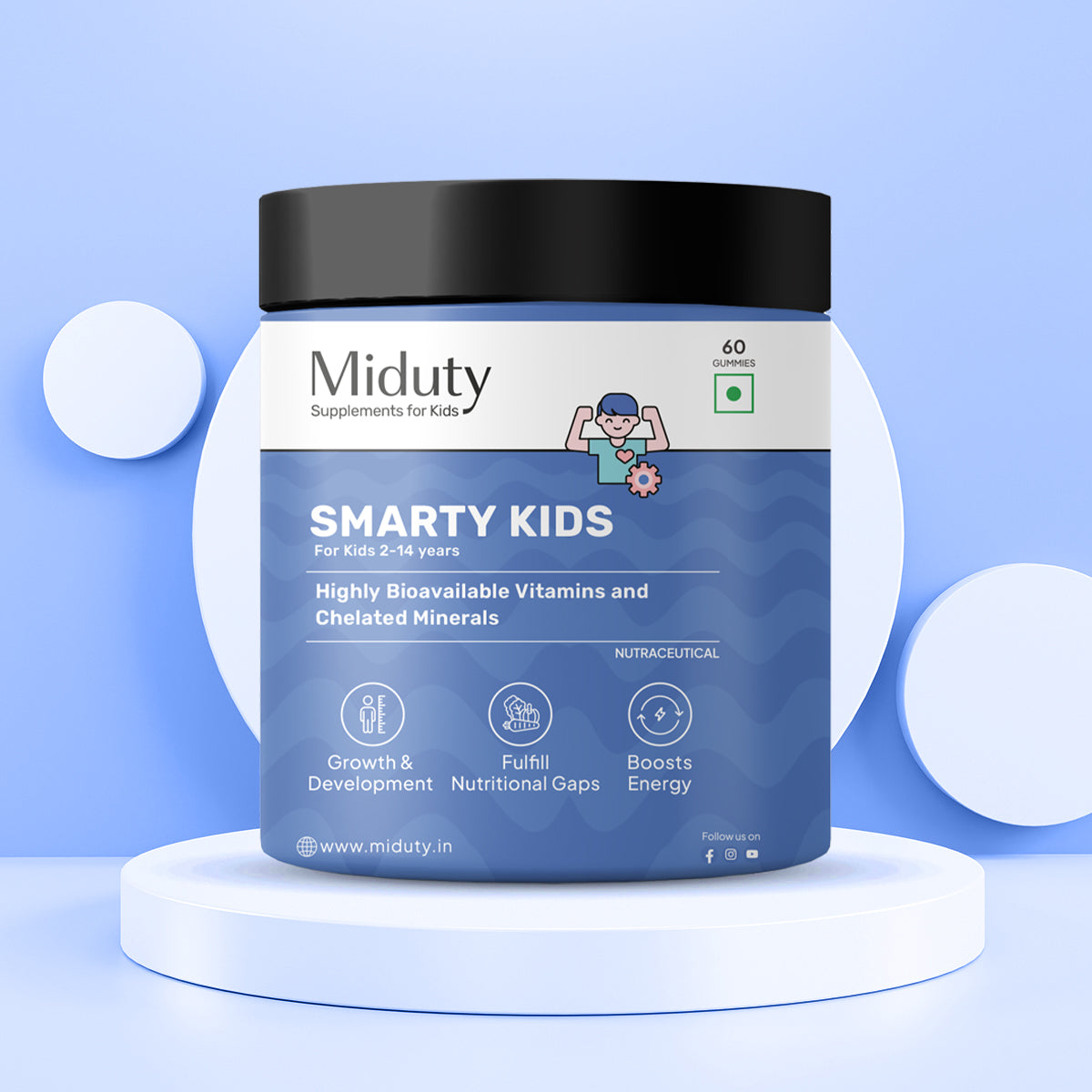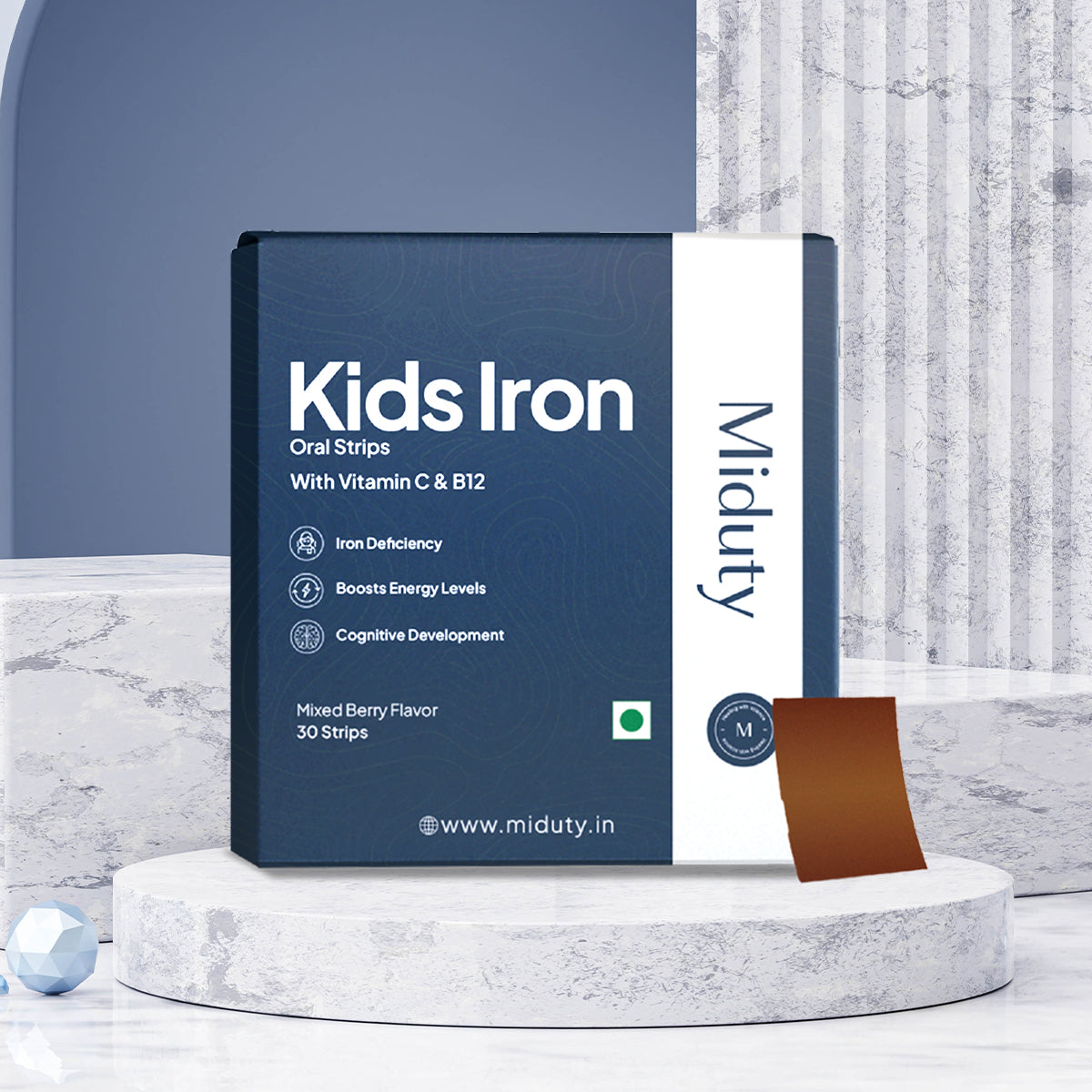
Top 10 Immunity-Boosting Foods for Kids (Indian Kitchen Edition)
Key Takeaways
1. 80% of immunity starts in the gut: Probiotic-rich foods like curd and yogurt support gut health, which is directly linked to stronger immunity and fewer infections in children.
2. Vitamin C powers up white blood cells: Amla contains almost 20 times more vitamin C than an orange, helping kids fight colds and recover faster from seasonal infections.
3. Turmeric & ginger: Curcumin in turmeric and gingerol in ginger have anti-inflammatory and antioxidant properties that enhance immune cell function and reduce infection severity.
4. Protein and zinc build defenses: Lentils, legumes, nuts, and seeds provide the building blocks for immune cells. Studies show that children with adequate zinc intake have up to 50% fewer respiratory infections.
5. Leafy greens pack a punch: Spinach, methi, and amaranth are rich in iron, vitamin A, and antioxidants, helping maintain key immune cells. Regular consumption may strengthen infection-fighting cells by 30-40%.
Children fall sick easily because their immune systems are still developing. From coughs and colds to seasonal infections, parents often find themselves searching for natural ways to protect their kids. Indian kitchen already has some of the world's most powerful immunity-boosting ingredients. Backed by scientific studies, Ayurveda, and generations of traditional wisdom, these foods can strengthen your child's natural defenses safely and effectively.
In this detailed, research-backed blog, you'll discover the top 10 immunity-boosting foods for kids, how they work, and simple ways to add them to their daily meals.
Why is Immunity Important for Kids?
A child's immune system is their natural defense against infections, bacteria, viruses, and other harmful pathogens. Strong immunity helps kids recover faster from common illnesses like colds, flu, or stomach bugs, reducing missed school days and improving overall growth. It also supports healthy development by aiding nutrient absorption and preventing frequent infections that can affect energy, appetite, and focus. Since children are still building their immunity, proper nutrition, sleep, and a healthy lifestyle play a vital role in strengthening their body's defenses. Good immunity sets the foundation for lifelong health and resilience.
Top Immunity-Boosting Foods for Kids
1. Citrus Fruits: Vitamin C Boost
Citrus fruits like oranges, lemons, mosambi, kinnow, and amla are among the good natural sources of vitamin C, a key nutrient for a strong immune system. Vitamin C enhances the production of white blood cells. It also protects cells from damage and helps in faster recovery from illnesses. Citrus fruits are also excellent for digestion, hydration, skin health, and iron absorption. Amla, in particular, contains almost 20 times more vitamin C than an orange, making it one of the most powerful immunity boosters in the Indian kitchen. [1] [2]
A 2013 research review in the Cochrane Database of Systematic Reviews concluded that regular vitamin C intake reduces the duration and severity of colds in both children and adults. This makes citrus fruits an essential part of a child's daily diet, especially during winter or school season when infections spread easily. [3]
If your child doesn't like eating whole fruits, try offering citrus in other fun forms:
- Freshly squeezed orange or mosambi juice
- Lemon water with honey
- Amla candy or amla murabba
- Fruit salads mixed with yogurt
- Orange-infused smoothies
- Fresh amla chutney mixed with jaggery and a little salt (use in small amounts for toddlers)
2. Turmeric: The Golden Shield
Turmeric (haldi) is one of the most potent immunity-boosting ingredients in Indian cooking. What makes turmeric so powerful is curcumin, its active compound, which has antimicrobial, anti-inflammatory, and antioxidant properties. According to a study, curcumin helps modulate the immune system and has been shown to enhance antibody responses, making it ideal for protecting children against infections. [4]
Turmeric has been used in Ayurveda for thousands of years to treat cough, cold, wounds, fever, and digestive issues. Its immune benefits come from its ability to fight free radicals, reduce inflammation, and support healthy white blood cell function. [5]
But here's something many parents don't know: curcumin absorbs better when combined with black pepper (piperine). So adding a pinch of black pepper makes turmeric even more effective.
You can add turmeric to:
- warm milk (haldi doodh)
- dals and sabzis
- turmeric rice
- turmeric ladoo
- soup or khichdi
3. Ginger: Nature's Antibiotic

Often called nature's antibiotic, ginger is packed with compounds like gingerol, shogaol, and zingerone, which have proven anti-inflammatory, antiviral, and antibacterial effects. A 2020 study highlighted ginger's ability to protect the respiratory system, reduce sore throat severity, and enhance immune function. This makes ginger particularly valuable during seasonal changes when kids are most vulnerable to flu and common colds. [6] [7]
Ayurveda recommends ginger for balancing vata and kapha, the doshas responsible for congestion, sluggishness, and respiratory infections in children. Ginger also stimulates appetite and digestion, helping kids absorb nutrients better to boost immunity. [8]
Kids often resist strong flavors, so one easy trick is to add ginger to:
- apple-ginger juice, ginger jaggery syrup, or ginger-infused lemon water.
- Ginger tea can be diluted with water and sweetened with honey (for kids above age 1 only)
- Grate a tiny amount into parathas, soups, dal, or homemade kadha.
- ginger-infused moong dal soup
4. Honey: Liquid Gold for Children
Honey, especially raw and unprocessed honey, is packed with antioxidants, enzymes, minerals, and natural sugars that boost energy and immunity. A modern study found that honey was more effective at reducing cough symptoms in children than over-the-counter cough syrups. [9] [10]
Honey's immune benefits come from its antibacterial and antiviral properties. It contains natural hydrogen peroxide, which helps fight pathogens. It also coats the throat and soothes irritation, making it ideal for kids who frequently suffer from coughs, especially during winter. Honey also improves gut health by promoting good bacteria, because almost 70% of the immune system resides in the gut.
However, one major caution: never give honey to children below 1 year of age, as it may cause infant botulism. For children above 1, a teaspoon of honey once or twice a day is safe and beneficial.
You can use honey in:
- warm water with lemon
- honey and cinnamon paste
- on roti as a spread
- in porridge or daliya
- in milkshakes or fruit bowls
Just remember not to heat honey excessively, as high temperatures can destroy its nutrients. Add it to slightly warm mixtures instead.
5. Curd/Yogurt: Probiotic Powerhouse

Curd is one of the most nutritious and child-friendly foods found in Indian kitchens. What makes it so powerful for immunity is its rich content of probiotics, good bacteria that keep the gut healthy. Since immunity and gut health are deeply connected, giving your child curd regularly can reduce infections. [11] [12]
Scientific research supports this: a study showed that children who consumed probiotic yogurt daily had fewer respiratory infections compared to those who didn't. Another study found that probiotics can reduce the severity and duration of colds by boosting antibody production. [13]
Curd is rich in calcium, protein, vitamin B12, and healthy fats, nutrients essential for growing kids. It also helps cool the digestive system, improves metabolism, and prevents constipation. During hot Indian summers, curd becomes incredibly soothing and hydrating.
Indian parents can introduce curd through:
- curd rice
- fruit yogurt bowls
- lassi or chaas (buttermilk)
- curd with jaggery
- raita with grated vegetables
- Add curd with parathas or khichdi
For immunity, homemade curd is better because it has live cultures and no added sugar.
6. Tulsi (Holy Basil): The Queen of Herbs
For children, tulsi offers protection against viral, bacterial, and fungal infections. Its leaves contain compounds like eugenol, ursolic acid, and apigenin, which have strong immunomodulatory properties. According to a 2017 study published in the Journal of Ayurveda and Integrative Medicine, tulsi enhances the body's ability to fight pathogens and reduces inflammation while supporting respiratory health. [14] [15]
Tulsi is especially beneficial for kids prone to frequent coughs, colds, allergies, or throat infections. It works by strengthening the respiratory system, clearing mucus, and improving lung function. [16]
Parents can give tulsi to kids in several gentle ways:
- Make a mild Tulsi tea by boiling 3-4 leaves in water and adding a bit of honey (for kids above 1 year).
- Tulsi-infused warm water is another effective option during flu season.
- Crush a few leaves and mix them with honey and ginger for a powerful natural remedy.
- add tulsi leaves to kadha or soups.
7. Garlic: The Immunity Booster Every Kitchen Has
Garlic is quite beneficial when it comes to building immunity. Garlic is rich in allicin, a compound released when garlic is crushed or chopped. Allicin has antimicrobial, antiviral, and antifungal properties that help the body fight infections naturally. [17]
A 2015 study in the Journal of Immunology Research found that garlic extract stimulates white blood cells, enhances antibody production, and helps the body respond more effectively to viruses. Another research review published in Clinical Nutrition shows that regular garlic consumption reduces the severity and duration of colds. [18]
For children, garlic also supports digestion and acts as a gentle detox agent. It improves gut flora, boosts nutrient absorption, and regulates metabolism benefits that contribute directly to better immunity.
If your child dislikes garlic, you can still incorporate it creatively like:
- Add crushed garlic to dal tadka.
- Mix it into homemade pasta sauce.
- Make garlic-flavored parathas or rotis.
- Add it subtly to sautéed vegetables.
- Roasting garlic makes it sweeter and milder, making it more kid-friendly.
- Give children garlic-infused warm ghee
8. Nuts & Seeds: Vitamin E Warriors

Nuts like almonds, walnuts, and cashews, and seeds like flax and sunflower are nutritional powerhouses loaded with vitamin E, healthy fats, antioxidants, and protein all essential for building strong immunity in kids. Vitamin E plays a crucial role in enhancing the body's natural defenses. It helps immune cells function effectively and protects them from oxidative damage.
A study found that children who consumed vitamin E-rich foods regularly showed better immune responses. Almonds also contain magnesium, fiber, and healthy fats that support brain development and growth.
For kids who are picky eaters, nuts are an easy way to provide concentrated nutrition in small portions. You can give nuts as:
- Almond milk
- Almond powder mixed in milk
- Overnight-soaked almonds
- Nut-based laddoos
- Nut butter on roti or toast
- Almond-date smoothie,
- powdered nuts added to porridge
- chikki (peanut/almond bars) in small pieces.
- For toddlers, finely powdered nuts are safer than whole nuts.
They also help stabilize blood sugar levels and keep children full for longer, making them a great snack option during school days.
9. Spinach & Green Leafy Veggies: Iron + Antioxidants Combo
Spinach and other leafy vegetables like methi, sarson, and amaranth (chaulai) are among the most nutrient-dense foods you can give your child. They are rich in iron, folate, calcium, magnesium, vitamin A, vitamin C, and powerful antioxidants that protect the immune system. One of the strongest antioxidant compounds found in spinach is beta-carotene, which helps strengthen infection-fighting cells. [19] [20]
A study published found that green vegetables help maintain innate lymphoid cells (ILCs) , a type of immune cell essential for protecting the body from infections. Without enough green veggies, these immune cells decline, making children more prone to illnesses.
Spinach also contains lutein, a plant compound known for its anti-inflammatory benefits. This makes it particularly helpful for kids who suffer from allergies or recurrent respiratory infections.
The trick is to make vegetables kid-friendly:
- You can blend spinach into soups
- make palak khichdi, palak poori, palak paneer, or spinach-cheese parathas.
- can also be added to smoothies along with banana and honey so kids don't notice the flavor.
10. Legumes & Lentils: Protein for Strong Immunity

Lentils (dal) and legumes (chickpeas, rajma, lobia) are rich in protein, a nutrient essential for building immune cells, repairing tissues, and supporting overall growth. Without enough protein, a child's immune system becomes weak and less responsive. [21]
Legumes also contain zinc, iron, folate, fiber, and plant-based antioxidants. Zinc plays a crucial role in immune function. A report stated that zinc deficiency is linked to increased risk of infections in children, especially respiratory illnesses.
Dal is one of the easiest foods to digest, making it perfect for kids of all ages. It helps maintain gut health, provides steady energy, and supports weight gain in underweight children. Moong dal, for example, is gentle on the stomach and excellent for kids recovering from illness.
To make lentils appealing to children, you can prepare:
- Dal khichdi
- Dal paratha
- Moong dal chilla
- Rajma rice
- Chole chaat
- Lentil cutlets (baked, not deep fried)
Adding ghee on top not only improves taste but also enhances nutrient absorption and boosts immunity through healthy fats.
Immunity Supplementation Support for Kids
While a balanced diet is the foundation of a child's immune health, targeted supplementation can help fill nutritional gaps, especially during seasons of frequent infections.
Effervescent immunity-boosting tablets combine essential nutrients like vitamin C, zinc, amla, elderberry, and echinacea to strengthen a child's natural defenses. These ingredients support white blood cell function, reduce oxidative stress, and may help shorten the duration of common colds.
The fizzy, easy-to-take form makes it child-friendly and gentle on the stomach. When paired with a nutritious diet, adequate sleep, and proper hygiene, such supplements can provide consistent immune support for growing kids.
Conclusion
Building strong immunity in children doesn't require complicated supplements or expensive superfoods. The most powerful immunity boosters are already present in every Indian kitchen: turmeric, ginger, garlic, honey, tulsi, curd, citrus fruits, nuts, leafy vegetables, and lentils. These ingredients, backed by science and traditional wisdom, naturally strengthen your child's immune system from within. When combined with good sleep, hydration, and active play, they form a protective shield that helps kids stay healthy all year long.
FAQ's on Immunity-Boosting Foods for Kids
Q1. Which fruit is rich in immunity?
Citrus fruits like oranges, lemons, and grapefruit are rich in vitamin C, which supports white blood cell production and immunity. Other fruits such as guava, papaya, strawberries, and kiwi also boost immunity with vitamins A, C, E, and antioxidants that help the body fight infections.
Q2. Which food boosts immunity in kids?
Foods like citrus fruits, berries, leafy greens, nuts, seeds, yogurt, and lean meats boost kids' immunity by providing key nutrients such as vitamin C, zinc, iron, and probiotics. Including these in a balanced diet helps strengthen the immune system and protect against infections.
Q3. What weakens a child's immune system?
A child's immune system can be weakened by poor nutrition, lack of sleep, high stress, and a sedentary lifestyle. Frequent exposure to pollution, excessive junk food, or untreated infections can also reduce immunity, making children more prone to illnesses.
Q4. What is the best natural immune booster for kids?
The best natural immune boosters for kids are nutrient-rich foods like citrus fruits, berries, leafy greens, nuts, seeds, yogurt, and eggs. These provide essential vitamins, minerals, antioxidants, and probiotics that support healthy immune function and help the body fight infections naturally.
Q5. Are there superfoods for child immunity?
Yes, certain "superfoods' can help support a child's immunity. Foods like amla (Indian gooseberry), berries, spinach, yogurt, nuts, seeds, and mushrooms are packed with vitamins, minerals, antioxidants, and probiotics that strengthen the immune system and help children fight infections more effectively.
Q6. Which vegetable has more immunity?
Leafy green vegetables like spinach, kale, and fenugreek (methi) are top immunity boosters for kids. They are rich in vitamins A, C, and E, iron, and antioxidants, which help strengthen the immune system and protect the body against infections.
References















